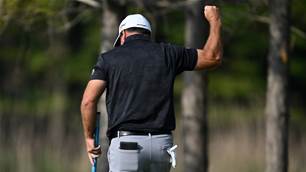Geoff Ogilvy knew his game was improving and in his latest column – published exclusively in the August issue – he wrote about discovering the formula to win again. He was right.
Geoff Ogilvy knew his game was improving. In his latest column – published in the August issue that went on sale on July 31 – the 2006 US Open Champion opened up about his form struggles but was upbeat about a change in his fortunes not being far away.
In just a matter of weeks after filing his exclusive column for Golf Australia, Ogilvy collected his eighth PGA Tour victory and his first since the season-opening Mercedes Championship in 2010. Here’s what Ogilvy was thinking on the eve of his return to the winner's circle.
EXCLUSIVE BY GEOFF OGILVY
Five years ago, I played a practice round with a close friend at Sawgrass just before the Players Championship. My mate was struggling with his swing. He was lost really. He hardly hit a fairway. And the rest of his game wasn’t any better. He was clearly lost and despondent. Afterwards, he spoke about how little fun he was having playing golf and was it worth him continuing?
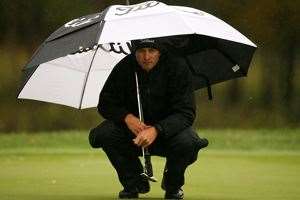 It's only a few years ago that Adam Scott was lost and despondent about his game ... he's since won the Masters and become World No.1. PHOTO: Getty Images
It's only a few years ago that Adam Scott was lost and despondent about his game ... he's since won the Masters and become World No.1. PHOTO: Getty ImagesAt the time, I must admit to not really understanding what Adam Scott was going through. But I do now. All the way through my amateur and professional careers in golf, every stepping stone has come with an extra layer of pressure. In pro golf I’ve had to keep my card, then win a tournament, then a major – all the while earning enough money to pay my own way. Initially that pressure is self-imposed, but over time that changes. As I have moved up the ladder, expectations have risen to the point where I am “supposed” to play well or at least expected to.
Most guys you see on tour have followed that path of gradual improvement. And that was me too, for the longest time. I never noticed how relatively easy it is to play well when you have been playing well. When I won a tournament, I had no stress for at least two years because I was exempt into pretty much everything. And it’s exponential. Every time I played well, I had more money in the bank, more experience and was happier with my game. It’s multi-faceted. There are so many more reasons to keep anyone playing well.
That makes sense of course. The more you are in contention to win, the more comfortable you become in such a stressful situation. The money is not an issue. And you don’t actually have to win any more. It’s perverse really. The better you play, the less you actually need to play well. And that is the best state of mind to be in to play golf well – when you don’t need to. It’s the unseen aspect of competitive golf.
Conversely, the worse you play, the more you need to play well, which is the ultimate cruelty. I can go into the locker room at almost any tournament and observe the varying levels of stress in players. Those playing well are cruising along, calling their private jets to take them to the next tournament. The guys who are struggling are looking miserable and kicking things across the room. And there is everything else between those two extremes. It’s amazing to see.
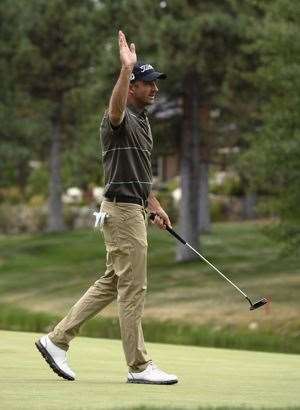 Geoff Ogilvy waves to the crowd after making his final putt on the 18th hole to win the Barracuda Championship. PHOTO: Getty Images.
Geoff Ogilvy waves to the crowd after making his final putt on the 18th hole to win the Barracuda Championship. PHOTO: Getty Images.On the PGA Tour, a loss of form becomes mostly a self-perception thing. After a period of success, the financial side of the business is less of an issue for most guys. But playing poorly is a blow to the ego if nothing else. Plus, the desire to play well never goes away. The better you do, the more fun it becomes. Playing badly is no fun, which is another great irony. I play my best golf when I’m having fun. But when I’m playing poorly I have less fun. Yet the best way to play better is to have more fun. Work that one out.
The fun aspect is harder to resolve when the game is your livelihood. I’m guessing that 99 percent of club golfers can shrug their shoulders after a bad day on the links and just go home without worrying too much. But that’s tough to do when your income is based on how well you play. It’s the ultimate tease when someone says, “just go out and have fun.” Well I can’t because I’m not playing well.
My current position isn’t unique of course. I look at guys like Steve Stricker and Henrik Stenson. Both had huge success early in their careers, lost the plot, then returned to the top of the game. Adam has done the same. He has worked it out and today he is way better than he was before his slump. He’s clearly one of the top-three players in the world.
Then there are guys like David Duval. He reached the top of the world rankings and won the Open Championship. But along the way he lost his desire to play. Nick Price also got to No.1, but didn’t like the attention that came with it when he got there. Some people crave that position, but Nick did not, which is fine. We’re all different in that respect.
Trevor Immelman is another intriguing case. I grew up playing with Trevor and he was always destined to win big things. He and Sergio Garcia were clearly the best teenage golfers in the world back in the late 1990s. And his whole life had been about being a great golfer. He did that, winning the Masters along the way, but the way things have gone since I’m guessing Trevor has discovered that there is more to life than golf. If so, good for him.
As for me, when my kids came along, my desire to go out on the road diminished. It wasn’t a conscious thing, but looking back I’m sure that was the case. I wasn’t in despair. Once out on tour I was fine in my old routine. But on some level, I was never quite the same out there. I know my desire to go home went up a lot, which was probably not healthy for my golf.
When I started to struggle a couple of years ago, I pushed too hard and played too much. I know I’ve done that the last 12 months. I’ve tried to force playing well again and the end result is that I am hitting the ball better than I ever have. But my scoring isn’t as good.
Take the recent US Open at Pinehurst. I had the most perfect preparation. I’d never played that well going into a major. But I got off to a rough start and, although I recovered reasonably well to the point where I was cruising along nicely on day two, a couple
of things went against me – a bad bounce and a dodgy lie – and suddenly I had missed the cut.
It’s very frustrating. When things are going well, you get the good bounce and the good lie and you make birdies instead of bogeys. There’s no explanation, other than overplaying makes you stale, which is when you get a bit miserable and want to go home.
On the other hand, I guess I’ve been really fortunate in that, to this point, golf always came easy to me. Growing up, I was always one for playing a lot more holes rather than beating balls on the range. I could miss four or five days of practice and not feel guilty about it. I always felt like I could work it out when I got there. And I did.
But when my struggles started I abandoned that approach. I started pushing and practising harder. I was on the range more. I was in the gym more often. I made sure I did everything “right.” But the more I tried to be
the perfect, hard-working professional, the worse I got. It was a classic mistake. But it’s human nature.
Anyway, over the last six months I have tried to get back to the way I did things earlier in my career, which hasn’t been easy. Practice is very addictive and I turned myself into a practiser more than a player. I could hit the 220-yard sign with my 5-iron six times in a row. But then I’d go out and miss the first green with my 5-iron. At some level, practising and playing are not really related.
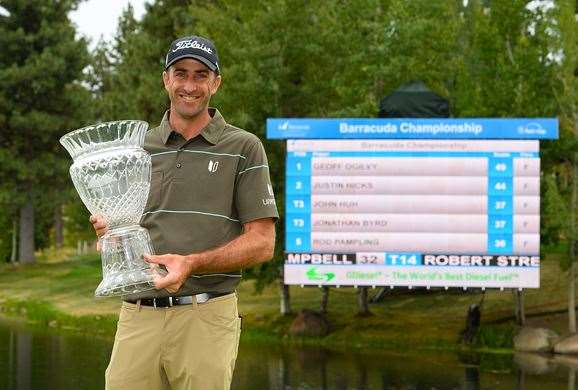 In the winner's circle again. Ogilvy claims the Barracuda Championship and the game is due to "be fun again". PHOTO: Getty Images.
In the winner's circle again. Ogilvy claims the Barracuda Championship and the game is due to "be fun again". PHOTO: Getty Images.Someone once told me that the difficulty of golf is that you are not trying to work out the game, you are trying to work out yourself. I forgot that. I was trying to work out golf. There’s nothing wrong with playing well and not doing it the way everyone else does it. The guys who made themselves the best in the world didn’t do it by copying someone else. They are the guys who are copied.
I’ve played with Angel Cabrera a few times over the last year. He’s been having a similar time to me. He’s been a bit miserable on the course for sure (until his win last month). But his coach and mentor, Charlie Epps, told me something Jack Nicklaus once said: “Don’t make golf more important than it really is”, which is spot on in my case. I did just that. And the more I’ve struggled, the more time I have spent thinking about how to work it all out.
No more though. I’ve recognised the fact that the best golfers in the world are not normally the ones who play the most. They have balance in their lives and once I have that restored, I’ll be back. The game will be fun again. So don’t worry folks, I’ll figure it out.
* GEOFF OGILVY is the thinking man’s Tour professional, whose opinion is well regarded by fellow players and officials. He writes exclusively for Golf Australia each month. Follow Geoff on Twitter @geoffogilvy
Related Articles
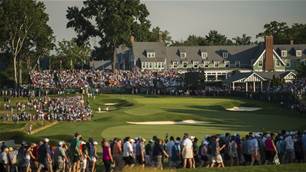
Feature Story: Oakmont Unleashed
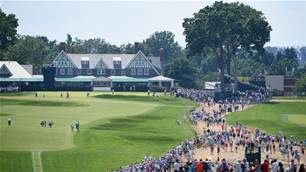
Ogilvy: U.S Open's toughness means testing limits
